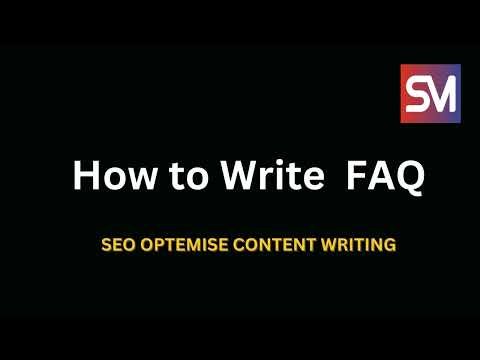Ultimate Guide: Writing an SEO-Optimized FAQ Page

In today’s digital landscape, where search engine visibility can make or break a business, having an SEO-optimized FAQ page is no longer optional—it’s essential. A well-crafted FAQ page not only answers your audience’s burning questions but also boosts your site’s search engine ranking, leading to increased traffic and engagement.
Creating such a page involves more than just gathering common questions. It’s about understanding your audience’s intent, using strategic keywords, and structuring the content to enhance user experience. When done right, an FAQ page can become a powerful tool that satisfies both visitors and search engine algorithms.
Curious about how to transform your FAQ page into a high-performing asset? Dive in as we unravel the steps to optimize every aspect, from choosing the right questions to technical SEO tweaks that can give your page the edge. Let’s get started!
Why is an FAQ Page Important for SEO?
An FAQ page is a treasure trove of potential for boosting SEO efforts. By addressing common questions, it naturally incorporates keywords and phrases that customers use to find your products or services. This alignment with search intent not only satisfies users but also helps search engines understand the context and relevance of your site.
Enhancing User Experience
User retention and engagement are critical factors for SEO. An informative FAQ page improves user experience by providing quick, easy-to-find answers, reducing bounce rates, and increasing the time visitors spend on your site. When users find what they need, they’re more likely to explore further, signaling to search engines that your site is valuable.
Rich Snippets and Voice Search
An optimized FAQ page can earn rich snippets, those eye-catching small bits of information that appear at the top of search results. This boosts visibility and click-through rates significantly. Additionally, with the rise of voice search, concise answers to direct questions are more important than ever, as they often get picked up by virtual assistants providing search results.
Leveraging these SEO benefits makes an FAQ page more than just a helpful resource—it’s an integral part of a comprehensive SEO strategy.
How to Research and Identify Common User Questions?
Understanding what your audience wants to know is the cornerstone of crafting a valuable FAQ page. Start by tapping into your existing customer support channels. Analyze emails, live chat transcripts, and support tickets to identify recurring themes and questions.
Don’t overlook the power of social media and online forums. Platforms like Twitter, Reddit, and Quora can be gold mines for uncovering what people are asking about your industry or business. Pay attention to frequent topics and concerns expressed by users.
Search engine results themselves can offer clues. Use tools like Keyword Planner or AnswerThePublic to discover the questions that people commonly search for. These tools can help you uncover popular queries related to your niche and ensure your FAQ page covers a broad spectrum of user interests.
Additionally, reach out for customer feedback through surveys or direct interviews. Asking your audience directly can reveal insights you might not find elsewhere, helping you create an FAQ page that truly resonates with your visitors.
By combining these strategies, you can develop a comprehensive list of questions that not only boosts SEO but also enhances user satisfaction.
Optimizing Your FAQ Page for Featured Snippets and Voice Search?
To snag a spot in featured snippets, precision and clarity are key. Structure your answers in a straightforward manner that directly addresses the question. Use bullet points or numbered lists for complex answers, as these formats are favored by search engines for snippet eligibility.
Focus on Conversational Keywords
Voice search leans heavily on conversational queries, often phrased as direct questions. Incorporate natural language and long-tail keywords in your FAQ responses to align with how users verbally ask questions, increasing the chance your content gets served in voice search results.
Remember, succinctness matters. Aim to concisely answer questions in one or two sentences, as this is preferable for both voice search responses and snippet inclusion. Keep your language simple and your answers precise.
Enhancing snippet potential further, use schema markup on your FAQ page. This structured data helps search engines comprehend your content better and decide if it fits snippet requirements. Implementing FAQ schema can also increase your page’s visibility in search results.
Stay mindful of these strategies to boost your FAQ page’s performance in both featured snippets and voice search, thereby amplifying your digital presence.
What Are the Best Practices for Structuring FAQ Page Content?
Effective structuring of your FAQ page enhances readability and contributes to SEO. Start with categorizing your questions. Group them by themes or topics to make navigation intuitive and user-friendly. This approach not only aids visitors but also helps search engines understand the organization of your content.
Consistency is crucial. Use a uniform format for your questions and answers to maintain clarity. Start each question with an interrogative word and follow with concise, informative answers. This will help in aligning with both user search behavior and SEO requirements.
Incorporate internal links where relevant. Link your answers to detailed blog posts or product pages to provide additional context and encourage users to explore more of your site. This practice can help decrease bounce rates and increase page views.
Lastly, a search functionality can add tremendous value. Allow users to search for specific queries on your FAQ page, ensuring they find the information they need quickly. This improves user experience and keeps them engaged longer.
By adhering to these best practices, your FAQ page can become an indispensable resource for users and a powerful asset for your site’s SEO strategy.
Ensuring Mobile-friendliness and Fast Loading Times for Your FAQ Page?
With the surge in mobile browsing, ensuring your FAQ page is mobile-friendly is crucial. Start by using responsive design techniques. This ensures your page adapts to various screen sizes, providing a seamless experience for users on smartphones and tablets.
Simplify navigation for mobile users. Implement a clean, uncluttered layout with easy-to-tap elements. Minimize the need for zooming and horizontal scrolling, allowing users to find answers swiftly.
Fast loading times are essential to keep users engaged. Optimize images by compressing them to reduce load times. Leverage browser caching and minify CSS and JavaScript files to further enhance page speed.
Consider implementing Accelerated Mobile Pages (AMP) to boost loading speed on mobile devices. This can lead to better user retention and improve search rankings, as page speed is a critical factor in Google’s algorithms.
By focusing on mobile-friendliness and fast loading times, you create a user-centric FAQ page that not only meets the needs of today’s mobile-first consumers but also strengthens your site’s overall performance in search engines.

Measuring Success and Optimizing the FAQ Page for Conversions?
An optimized FAQ page is more than informative—it’s a conversion tool. To gauge its effectiveness, start by tracking key metrics. Use analytics to monitor page views, bounce rates, and average time spent on the page. These insights will reveal how well the page retains and engages users.
Conversion Tracking
Incorporate conversion tracking to see how many visitors transition from the FAQ page to other valuable actions on your site, like signing up for a newsletter or making a purchase. This will help you understand the direct impact of your FAQ on your business objectives.
Regularly update your FAQ content based on user interaction data. Identify questions that frequently lead to conversions and ensure they are prominently featured. For questions with less impact, reassess and refine the content.
Finally, conduct A/B testing to explore variations in question phrasing, answer structure, and call-to-action placement. Determine which elements most effectively drive user engagement and conversion rates.
By continuously measuring success and optimizing content, your FAQ page can play a pivotal role in guiding users further into your sales funnel, enhancing both customer satisfaction and your bottom line.
Addressing New User Queries and Updating Your FAQ Page Consistently?
Keeping your FAQ page up-to-date is essential to its effectiveness. Start by actively gathering new user queries through feedback channels, such as customer support or social media interactions. This real-time input helps you identify emerging questions and ensure your page stays relevant.
Establish a routine update schedule. Regularly revisiting your FAQ ensures any redundant or outdated information is removed and new insights are incorporated promptly.
Incorporate analytics to identify questions that have declining engagement or relevance. By replacing or revising these questions, you maintain a dynamic FAQ page that continues to meet user needs.
Additionally, be proactive in addressing seasonal trends or changes in products and services. Adapting your FAQ content to reflect these shifts ensures users always have access to accurate information.
Consistent updates not only benefit users but also signal to search engines that your content is fresh and engaging, aiding in maintaining or improving SEO rankings. By embedding this practice into your website maintenance routine, you keep the FAQ page a vital, evolving resource for both search engines and your audience.
The Bottom Line: Creating a Comprehensive and User-friendly FAQ Page Strategy
In conclusion, an effective FAQ page is more than just a list of questions and answers. It’s a strategic asset that improves user experience and enhances SEO performance. By focusing on key elements, such as knowing which questions to include, how to optimize for search engines, and ensuring mobile responsiveness, you can create a page that truly resonates with your audience.
Regular updates and consistent monitoring are vital. As user needs evolve, your FAQ page should adapt, staying relevant and helpful. This not only keeps visitors satisfied but also signals freshness to search engines, beneficial for your site’s ranking.
Additionally, structuring your content in an accessible way, with clear navigation and a focus on fast loading times, will enrich the user journey. Implementing conversion tracking can further optimize your FAQ page, providing insights to fine-tune your content strategy and drive meaningful actions on your site.
Ultimately, a well-thought-out FAQ page serves multiple purposes. It supports customer service by addressing common issues, aids in SEO efforts through strategic keyword use, and can lead to higher conversion rates by guiding users towards desired actions.
Crafting such a page isn’t a one-time task but a continual process of improvement. With careful attention to detail and a focus on user-centric design, your FAQ page can become a powerhouse for engaging your audience and achieving your business goals. So, invest the time and effort; the returns, in terms of enhanced user satisfaction and improved site performance, are well worth it.



